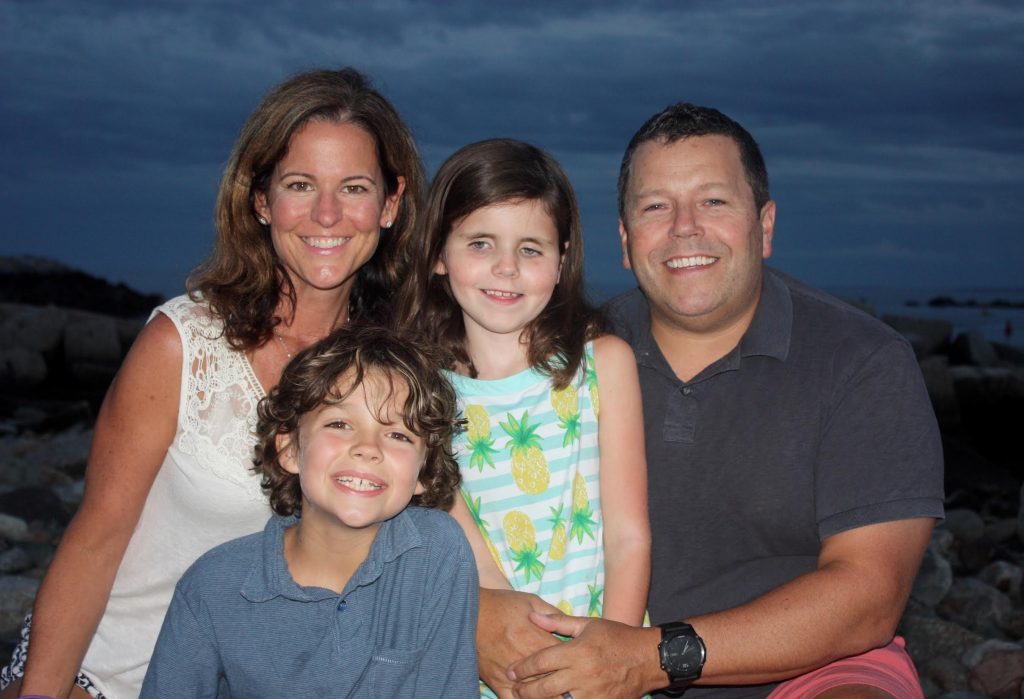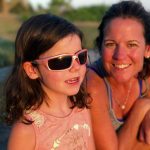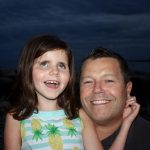Living With LCA: Annie’s Story

Annie Cohane takes singing lessons and piano lessons, she runs track, she’s working on swimming, and she’s a second-grader at an elementary school in Norwell, Mass.
She’s 8 years old and an emerging Braille reader.
“She’s a happy, very happy-go-lucky, strong-willed, little girl,” Annie’s mom, Jenny, said.
The goal for Jenny and her husband, Kevin, is for Annie to become as independent as possible.
She rides the bus to school, she goes on play dates.
 “She just figured out she was blind in the last few years,” Jenny recently said. “So far, it turns out it doesn’t affect her at all.”
“She just figured out she was blind in the last few years,” Jenny recently said. “So far, it turns out it doesn’t affect her at all.”
In 2009 when Annie was 2 months old, she involuntarily moved her eyes side to side, prompting a diagnosis of nystagmus, a condition affecting about 24 out of 10,000 children.
A month later Annie underwent an electroretinogram (ERG), showing a diagnosis of Leber congenital amaurosis (LCA) and that Annie was blind.
“I was shocked,” Kevin said. “I probably didn’t take a breath for 50, 90 seconds, trying to figure out what that meant. You never imagined your child would be anything but happy and healthy.”
Genetic testing later showed a mutation in her CEP290 gene.
The Cohanes had hope, however, because doctors assured them that cures and treatments were in the pipeline to help people like Annie with LCA.
Barely wrapping their heads around the life-changing news, they needed to tell their families. Jenny  already had moved onto the planning side of caring for Annie, while Kevin made calls to family and friends.
already had moved onto the planning side of caring for Annie, while Kevin made calls to family and friends.
“We were only concerned about Annie,” Kevin said. “They were concerned about Annie and us.”
While still processing the news, Jenny and Kevin – who met while training for triathlons, literally and figuratively crossing each other’s paths – got busy.
Early intervention specialists came to the house weekly, and then Annie enrolled in an infant/toddler program at the Perkins School for the Blind until she was 3. They worked to ensure their little girl’s access to any available resources to help her become confident and independent – just like any other child.
 Clearly these specialists – social workers, occupational therapists, vision specialists, physical therapist, speech therapists – helped Jenny and Kevin navigate this unfamiliar world with Annie and her older brother, Petey.
Clearly these specialists – social workers, occupational therapists, vision specialists, physical therapist, speech therapists – helped Jenny and Kevin navigate this unfamiliar world with Annie and her older brother, Petey.
Then, these endurance athletes, who happen to have fund-raising experience, decided after attending Foundation for Retinal Research conferences to help fund research into LCA.
Jenny came up with the idea of giving parents a nice night out, and in 2012, they turned their backyard into a big fund-raising party with plenty of donated food, drink and live music.
The parties, each with a theme, became a platform for learning from Annie. They chose themes in which partygoers could take away their experience and apply it to their lives. They ranged from stop-and-smell-the-rosemary to back-to-basics.
“That is how we try to live our life,” Jenny said.
Two years ago, 350 people came to their barn and backyard. This past September, they raised more than $37,000, bringing their total over the years to more than $160,000. They originally gave the funds to the Foundation for Retinal Research, and now they go to the Foundation Fighting Blindness since the FRR rolled into the FFB. Also, this year more than $2,400 went to New England Adaptive Sports.
Attending this year’s Dinner in the Dark presented by Sofia Sees Hope also gave the Cohanes hope. At the event, Jenny and Kevin sat next to Jack McCormick and his 5-year-old lab/golden-mix guide dog, Jake. Jack is a 20-year-old business honors student in Ontario, Canada. He also is a thoughtful, well-spoken advocate for accessibility, and he is a mentor, urging people with LCA to tell their stories to boost self-confidence and attract researchers.
“He was phenomenal,” Jenny said. “He’s exactly what I want Annie to be.”
Eight years ago when Kevin came home after getting Annie’s diagnosis, he took a nap, and when he woke up, he told Jenny he had a dream that Annie was sitting across from him in a hospital room.
“She was 13, 14, and I could tell she could see me, and I started crying, and she said, ‘Dad, why are you crying?’”
He told her, “I’m just so happy that you can finally see what we look like.”
She replied: “But I’ve known what you looked like all along.’’
Kevin believed then, as he does now, that his dream foreshadows a time when researchers find a cure for LCA-CEP290 and Annie will see.
In October, the FDA recommended approval for genetic therapy for the LCA-RPE65 gene, one of more than 25 genes associated with LCA. If approved, the therapy would be the first of its kind for LCA and the first in the nation for any genetic disease. Also, the research in progress when Annie was an infant is now well into later stages of study.
Kevin said after the dream he felt an amazing sense of peace.
“I just felt confident we’d be able to get through it, even if we didn’t know what we were facing, he said. “All we have to do is love her to our best ability and everything is going to be fine in the end.”
